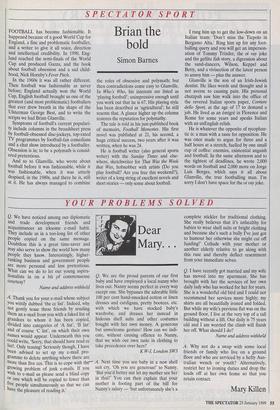SPECTATOR SPORT
Brian the bold
Simon Barnes
FOOTBALL has become fashionable. It happened because of a good World Cup for England, a fine and problematic footballer, and a writer to give it all voice, direction and intellectual credibility. In 1990, Eng- land reached the semi-finals of the World Cup and produced Gazza, and the book about football obsession and a sad child- hood, Nick Hornby's Fever Pitch.
In the 1960s it was all rather different. Then football was fashionable as never before; England actually won the World Cup, English football brought us one of the greatest (and most problematic) footballers that ever drew breath in the shape of the Ulsterman George Best, and to write the scripts we had Brian Glanville.
Symptoms of football's current populari- ty include columns in the broadsheet press by football-obsessed disc-jockeys, top-rated TV programmes by football-fan comedians and a chat show introduced by a footballer. Obsession is in; to be a polymath is consid- ered pretentious.
And so to Glanville, who wrote about football before it was fashionable, while it was fashionable, when it was utterly despised, in the 1980s, and there he is, still at it. He has always managed to combine the roles of obsessive and polymath; but then contradictions come easy to Glanville. In Who's 11/1w, his interests are listed as `playing football'; unimpressive enough until you work out that he is 67. His playing style has been described as `agricultural'; he still resents that. A glance higher up the column restores the reputation for polymathy.
The tale is told in his just-published book of memoirs, Football Memories. His first novel was published at 21, his second, a huge critical success, two years after it was written, when he was 24.
He is football writer (also general sports writer) with the Sunday Times and else- where, sketchwriter for That Was the Week that Was, hobnobber with artists (Do you play football? Are you free this weekend?), writer of a long string of excellent novels and short stories — only some about football. I rang him up to get the low-down on an Italian team: 'Don't miss the Tiepolo in Bergamo Alta.' Ring him up for any foot- balling query and you will get an imperson- ation of Tommy Trinder, the oi vay joke and the gefilte fish story, a digression about the sand-dancers, Wilson, Keppel and Betty, and a vivisection of the latest person to annoy him — plus the answer.
Glanville is the son of an Irish-Jewish dentist. He likes words and thought and is not averse to causing pain. His personal chutzpah saw him walk into the office of the revered Italian sports paper, Corriere dello Sport, at the age of 17 to demand a job. He lived as an emigrd in Florence and Rome for some years and speaks Italian with an unEnglish relish.
He is whatever the opposite of sycophan- tic is: a man with a taste for opposition. He was once made to argue for three and a half hours at a stretch, fuelled by one small cup of coffee: enemies, existential anguish and football. In the same afternoon and to the tightest of deadlines, he wrote 2,000 words on football and 2,000 more on Jorge Luis Borges, which says it all about Glanville, the true footballing man. I'm sorry I don't have space for the oi vay joke.


























































 Previous page
Previous page